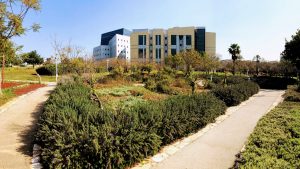Home » Programs » Full Degree Programs » Undergraduate - Fully instructed in English » BA in Communication & English Literature
Home » Programs » Full Degree Programs » Undergraduate - Fully instructed in English » BA in Communication & English Literature




For the 2023-2024 study program click here
Interested in the media, advertising, public relations, writing, marketing, spokesmanship in industry or government? Love the English language – and thirsty to learn from internationally recognized faculty from the world’s leading universities?
Strong communication skills, especially in English, are crucial in today’s global economy. The School of Communication at Bar-Ilan University is one of the few academic institutions that offers research and training in International Communication and Public Diplomacy. Students immerse themselves in small workshops on New Media, Advertising, Public Relations, and Broadcast Media – all instructed by internationally renowned researchers and lecturers.
The Department of English Literature and Linguistics at Bar-Ilan University offers students a solid foundation in the history and development of English and American literature, with classes spanning the work of great canonical authors such as Shakespeare, Milton, Austen, and Dickens as well as contemporary authors. Courses and assignments also aim to develop high-level skills of analysis, critical thinking, argumentation, and self-expression.
The joint double-major BA in Bar-Ilan University’s School of Communication and Department of English Literature and Linguistics gives students an edge in their future careers as they study how communication techniques and technologies shape society and culture, while developing and refining excellent skills of English writing and analysis. Through this rich, combined program, students gain a greater understanding of multiculturalism – a key requirement in our world’s increasingly globalized economy.

Our graduates are sought-after and well-established in all fields of communication, both locally and globally. Many of them work in marketing, advertising, and public relations offices, radio and TV stations, website companies, and the press, and as media consultants in government and private offices. Of course, some have chosen to pursue academic research and teaching careers. And remember, English is the lingua franca of the Western world and permeates all industries. No matter what your desired field of work may be, this degree is an invaluable asset.

See here for more information on “Bar-Ilan Credits”
*Judaic Studies courses are academic courses in a variety of fields within the Faculty of Jewish Studies, offered through The School of Basic Jewish Studies. Admitted students who are not Jewish and would prefer to take 10 credits in General Studies courses should contact their program coordinator.
**General Studies courses are any course offered at the University (over 6,000) that is not related to your major and is not Judaic Studies. Students with a minimum level 4 Hebrew are permitted to take courses in Hebrew, should they choose.
*** Depending on their English language test scores, students may be required to take additional classes in English as a foreign language.

International School
Bar-Ilan University
Ramat-Gan, Israel 5290002
Tel: +972- 3-738-4245
Email for further information
[email protected]

For the complete admission requirements for the English Literature program, please click here
For admission to the Communication program, the minimum requirement is a score of 98 from high school (only from accredited countries) or a score of 1200 on the SAT.
Please note that for a double major, you must meet the requirements for both programs.
Leave your details and we’ll get back to you soon
Explore a range of undergraduate degrees in English, including Political Science, Communication, and Humanities. We also offer 16 diverse graduate programs and a brand-new Cyber Security & Data Protection certificate – all in English!

If you find an error in content or missing information – please update us. In any case, the binding information appears on the website of the Council for Higher Education.
We firmly believe that the internet should be available and accessible to anyone, and are committed to providing a website that is accessible to the widest possible audience, regardless of circumstance and ability.
To fulfill this, we aim to adhere as strictly as possible to the World Wide Web Consortium’s (W3C) Web Content Accessibility Guidelines 2.1 (WCAG 2.1) at the AA level. These guidelines explain how to make web content accessible to people with a wide array of disabilities. Complying with those guidelines helps us ensure that the website is accessible to all people: blind people, people with motor impairments, visual impairment, cognitive disabilities, and more.
This website utilizes various technologies that are meant to make it as accessible as possible at all times. We utilize an accessibility interface that allows persons with specific disabilities to adjust the website’s UI (user interface) and design it to their personal needs.
Additionally, the website utilizes an AI-based application that runs in the background and optimizes its accessibility level constantly. This application remediates the website’s HTML, adapts Its functionality and behavior for screen-readers used by the blind users, and for keyboard functions used by individuals with motor impairments.
If you’ve found a malfunction or have ideas for improvement, we’ll be happy to hear from you. You can reach out to the website’s operators by using the following email
Our website implements the ARIA attributes (Accessible Rich Internet Applications) technique, alongside various different behavioral changes, to ensure blind users visiting with screen-readers are able to read, comprehend, and enjoy the website’s functions. As soon as a user with a screen-reader enters your site, they immediately receive a prompt to enter the Screen-Reader Profile so they can browse and operate your site effectively. Here’s how our website covers some of the most important screen-reader requirements, alongside console screenshots of code examples:
Screen-reader optimization: we run a background process that learns the website’s components from top to bottom, to ensure ongoing compliance even when updating the website. In this process, we provide screen-readers with meaningful data using the ARIA set of attributes. For example, we provide accurate form labels; descriptions for actionable icons (social media icons, search icons, cart icons, etc.); validation guidance for form inputs; element roles such as buttons, menus, modal dialogues (popups), and others. Additionally, the background process scans all of the website’s images and provides an accurate and meaningful image-object-recognition-based description as an ALT (alternate text) tag for images that are not described. It will also extract texts that are embedded within the image, using an OCR (optical character recognition) technology. To turn on screen-reader adjustments at any time, users need only to press the Alt+1 keyboard combination. Screen-reader users also get automatic announcements to turn the Screen-reader mode on as soon as they enter the website.
These adjustments are compatible with all popular screen readers, including JAWS and NVDA.
Keyboard navigation optimization: The background process also adjusts the website’s HTML, and adds various behaviors using JavaScript code to make the website operable by the keyboard. This includes the ability to navigate the website using the Tab and Shift+Tab keys, operate dropdowns with the arrow keys, close them with Esc, trigger buttons and links using the Enter key, navigate between radio and checkbox elements using the arrow keys, and fill them in with the Spacebar or Enter key.Additionally, keyboard users will find quick-navigation and content-skip menus, available at any time by clicking Alt+1, or as the first elements of the site while navigating with the keyboard. The background process also handles triggered popups by moving the keyboard focus towards them as soon as they appear, and not allow the focus drift outside of it.
Users can also use shortcuts such as “M” (menus), “H” (headings), “F” (forms), “B” (buttons), and “G” (graphics) to jump to specific elements.
We aim to support the widest array of browsers and assistive technologies as possible, so our users can choose the best fitting tools for them, with as few limitations as possible. Therefore, we have worked very hard to be able to support all major systems that comprise over 95% of the user market share including Google Chrome, Mozilla Firefox, Apple Safari, Opera and Microsoft Edge, JAWS and NVDA (screen readers), both for Windows and for MAC users.
Despite our very best efforts to allow anybody to adjust the website to their needs, there may still be pages or sections that are not fully accessible, are in the process of becoming accessible, or are lacking an adequate technological solution to make them accessible. Still, we are continually improving our accessibility, adding, updating and improving its options and features, and developing and adopting new technologies. All this is meant to reach the optimal level of accessibility, following technological advancements. For any assistance, please reach out to